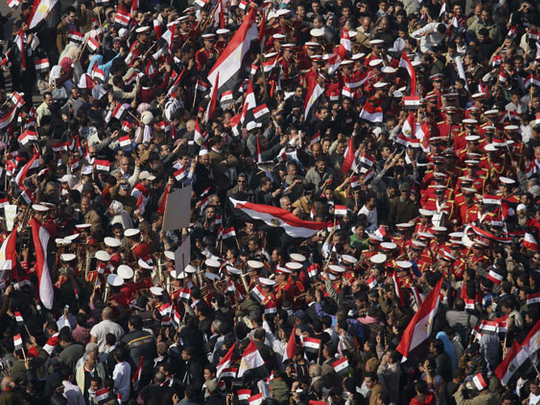
Every authoritarian leader believes ‘après moi, le deluge!' (After me, the deluge!) Former Egyptian president Hosni Mubarak too persuaded himself that if he deprived his people of his great leadership, Egypt would plunge into chaos and those nuts from the Muslim Brotherhood would take over.
The ‘last pharaoh' remained defiant till the very end — and deaf to the crescendo rising from the streets of Egypt and blind to the unmistakable writing on the wall.
In the end though, none of his tactics to survive a few more months worked. Nothing, including the little, petty games of big powers, could save him or derail the revolution knocking on Egypt's doors.
The die was cast. Indeed, Mubarak's fate — and that of other authoritarian leaders — was sealed the day the people in Tunisia showed Zine Al Abidine Bin Ali the door. The Middle East's date with destiny had finally arrived and Egypt — and the Arab world — will never be the same again.
It's people power at its most potent. Arabs have crossed the proverbial Rubicon and nothing can now persuade them to go back, or turn back the clock. This democratic metamorphosis is now irreversible, no matter what the scheming Israelis and their nervous patrons do.
What makes Egypt seminal and critical for the Middle East, and the world, is the fact that it has at last set the long imprisoned Arab soul free. The fall of a powerful authoritarian regime heading the most populous Arab nation has unleashed the fighting spirit of the Arabs. Egypt has rediscovered the Arabs' confidence and their esteem for themselves.
Egypt will transform the world around it by changing itself. It holds the key to the Middle East's future.
As an Arab writer argued recently, Arabs haven't witnessed any significant victory since Saladin the Great defeated the Crusaders some 800 years ago. The legacy of the great warrior king lives on in the proud falcon that is the insignia of Egyptian army, and that of numerous Arab countries.
United by faith
Egypt demonstrated once again that nothing stands in the way of a people united by a yearning for change and faith in the future.
Those marching on the streets of Egypt and elsewhere in the region, from Algeria to Yemen and beyond, offer hope — and a much needed sense of purpose and direction to the faceless, long dispossessed multitudes across the globe.
Suddenly, it's cool to be Arab, easily the most vilified and demonised character in western discourse and culture.
The Tahrir Square has elbowed out the Tiananmen Square and will remain seared in popular imagination for years to come, long after crowds have gone home. Those young people — and old — standing their ground at the Tahrir Square day after day with a simple yet defiant finality make you proud.
You don't have to be an Egyptian, an Arab or a Muslim to savour the moment. You only need to be alive. No wonder people everywhere are identifying and celebrating with the Egyptians.
In his 2009 Cairo speech, and in his inaugural address before that, US President Barack Obama had reached out to the Arabs and Muslims, seeking a "new way forward." And people of Tunisia and Egypt have given him just that — a new way forward!
Yet all you've heard over the past three weeks from Washington — and from other western capitals — is diplomatic gobbledygook that means nothing.
The best emanated from Israel. "When there are rapid changes as it happened in Iran," Prime Minister Benjamin Netanyahu warned just before Mubarak fell, "an oppressive regime of radical Islam will rise. Such a regime will crush human rights and will not allow democracy or freedom, and will constitute a threat to peace."
Now we need lessons in democracy, freedom and human rights from those who have stolen someone else's land and enslaved its population!
US Secretary of State Hillary Clinton backs Israel's warning, "revolutions have overthrown dictators in the name of democracy, only to see the process hijacked by new autocrats."
What is the West really afraid of? What's it about Islam that so terrifies the champions of democracy and freedom? But it's not Islam, as author Noam Chomsky argues, but independence of the Middle East that worries the West.
In a fine dispatch from Cairo titled Tehran 1979 or Berlin 1989?, Roger Cohen warns the West against dealing with Egypt the way it dealt with Iran after the 1979 revolution. Cohen suggests a more "nuanced approach" like the one the West adopted after the fall of the Berlin wall and in the run up to the fall of Soviet Union and its allies across eastern Europe .
So what's it going to be? Tehran '79 or Berlin '89? Whichever way the West goes, it's not going to be the Egyptian way. Gone is the time of the empire ruling by proxy. It's time for the Arabs to chart their own course without prompting by the empire. The sooner western powers and their minions realise this, the better for everyone.
Call it Islamic resurgence, Arab revival or whatever but a giant has awakened after long centuries of slumber. Change has come to the Middle East at last and for once it's not choreographed by the empire but driven by people power. And it's not so bad being an Arab.
Aijaz Zaka Syed is a Gulf-based commentator.









